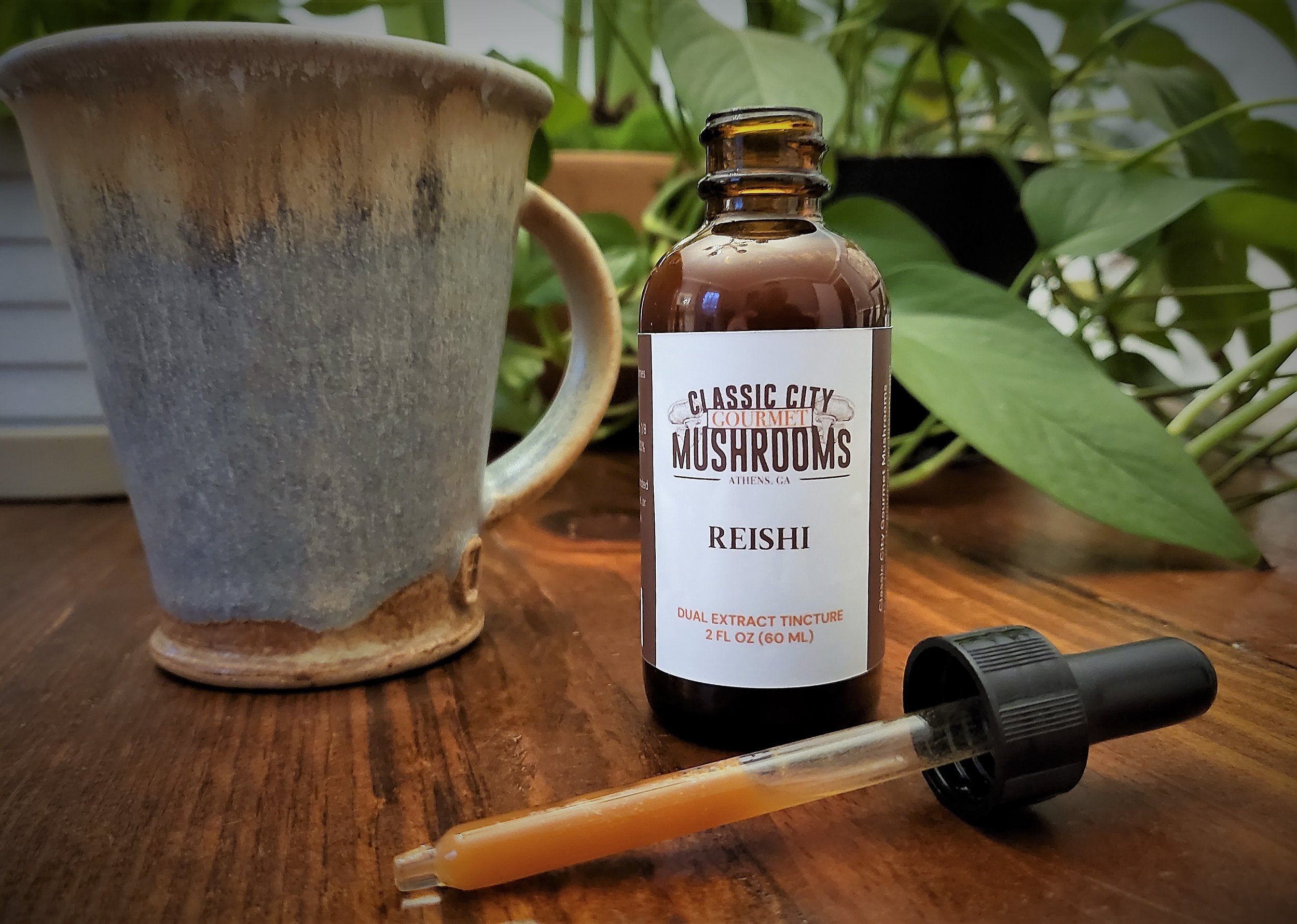Reishi Mushrooms
Ganoderma Lucidum
Reishi mushroom conk
Reishi mushrooms are an interesting species of fungus that grows in various parts of the world, especially in subtropical and temperate climates. They can grow on dead or decaying trees, stumps, logs, and other organic material. Reishi mushrooms have a tough, woody texture and are usually dark brown or reddish-brown in color. They are relatively slow-growing and can take up to a year to reach maturity. Reishi mushrooms have a bitter taste and contain several compounds, including triterpenes, polysaccharides, and proteins, which are believed to have medicinal properties. These compounds have been researched for their potential to improve overall health and boost the immune system.
The Reishi mushroom derives much of its power from compounds that hold the potential to support vitality, healthy immune system functioning, cardiovascular, kidney and adrenal health, a healthy inflammatory response and a balanced sleep cycle. An adaptogenic poster child, Reishi assists with the body’s response to stress and has four unique compounds, Ganoderic acids A through D, that may support a healthy histamine response during allergy seasons.
Reishi contains more than 100 polysaccharides and 100 triterpenoids within the mushroom fruiting body. Specifically, a type of polysaccharide known as beta-glucans (1,3 / 1,6 beta-glucans) which are complex long-chain sugars contained within the fungi’s cellular walls, are largely responsible for its health benefits. To that end, the Reishi mushroom is a beta-glucan powerhouse, with up to 50% of its fruit body by dry weight composed of them. Turkey Tail is the only other mushroom that comes close to Reishi's beta-glucan content.
Much of the Reishi mushrooms’ other health benefits are thanks to the plethora of unique triterpenoids it possesses. In fact, it has so many unique triterpenoids that they’re called Ganoderic acids and lucidenic acids, a nod to the taxonomic name of Reishi, Ganoderma lucidum. These acids are what give Reishi mushrooms and extracts their characteristic bitter taste.
Try our
*Please understand that most of these studies have been conducted on mice or in vitro, known as “test tube studies.” Currently, double-blind placebo human clinical trials for medicinal mushrooms are scarce.
References:
Cui, X. Y., Cui, S. Y., Zhang, J., Wang, Z. J., Yu, B., Sheng, Z. F., ... & Zhang, Y. H. (2012). Extract of Ganoderma lucidum prolongs sleep time in rats. Journal of Ethnopharmacology, 139(3), 796-800.
Dudhgaonkar, S., Thyagarajan, A., & Sliva, D. (2009). Suppression of the inflammatory response by triterpenes isolated from the mushroom Ganoderma lucidum. International immunopharmacology, 9(11), 1272–1280. https://doi.org/10.1016/j.intimp.2009.07.011
El-Mekkawy, S., Meselhy, M. R., Nakamura, N., Tezuka, Y., Hattori, M., Kakiuchi, N., ... & Otake, T. (1998). Anti-HIV-1 and anti-HIV-1-protease substances from Ganoderma lucidum. Phytochemistry, 49(6), 1651-1657. https://www.sciencedirect.com/science/article/abs/pii/S0031942298002544
Jin, X., Beguerie, J. R., Sze, D. M. Y., & Chan, G. C. (2012). Ganoderma lucidum (Reishi mushroom) for cancer treatment. Cochrane Database of Systematic Reviews, (6).
Khan, I., Huang, G., Li, X., Leong, W., Xia, W., & Hsiao, W. W. (2018). Mushroom polysaccharides from Ganoderma lucidum and Poria cocos reveal prebiotic functions. Journal of Functional Foods, 41, 191-201.
Li, H., Xiao, Y., Han, L., Jia, Y., Luo, S., Zhang, D., ... & Bao, H. (2021). Ganoderma lucidum polysaccharides ameliorated depression-like behaviors in the chronic social defeat stress depression model via modulation of Dectin-1 and the innate immune system. Brain Research Bulletin, 171, 16-24.
Lin, Z. B., & Zhang, H. N. (2004). Anti-tumor and immunoregulatory activities of Ganoderma lucidum and its possible mechanisms. Acta Pharmacologica Sinica, 25, 1387-1395.
Liu, L. Y., Chen, H., Liu, C., Wang, H. Q., Kang, J., Li, Y., & Chen, R. Y. (2014). Triterpenoids of Ganoderma theaecolum and their hepatoprotective activities. Fitoterapia, 98, 254-259.
Matsuzaki, H., Shimizu, Y., Iwata, N., Kamiuchi, S., Suzuki, F., Iizuka, H., ... & Okazaki, M. (2013). Antidepressant-like effects of a water-soluble extract from the culture medium of Ganoderma lucidum mycelia in rats. BMC complementary and alternative medicine, 13(1), 1-8.
The Fungal Pharmacy: The Complete Guide to Medicinal Mushrooms and Lichens of North America, by Robert Rogers, North Atlantic Books, 2011, pp. 172–184.
Sohretoglu, D., & Huang, S. (2018). Ganoderma lucidum polysaccharides as an anti-cancer agent. Anti-Cancer Agents in Medicinal Chemistry (Formerly Current Medicinal Chemistry-Anti-Cancer Agents), 18(5), 667-674. https://www.ncbi.nlm.nih.gov/pmc/articles/PMC6624854/
Wachtel-Galor S, Yuen J, Buswell JA, et al. Ganoderma lucidum (Lingzhi or Reishi): A Medicinal Mushroom. In: Benzie IFF, Wachtel-Galor S, editors. Herbal Medicine: Biomolecular and Clinical Aspects. 2nd edition. Boca Raton (FL): CRC Press/Taylor & Francis; 2011. Chapter 9. Available from: https://www.ncbi.nlm.nih.gov/books/NBK92757/


